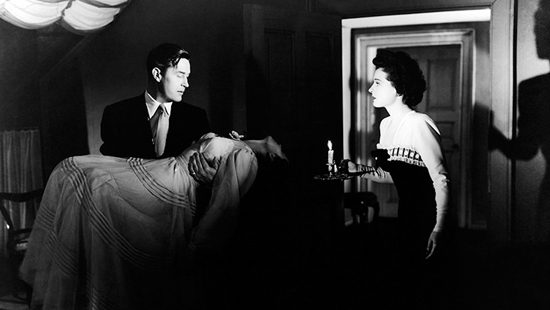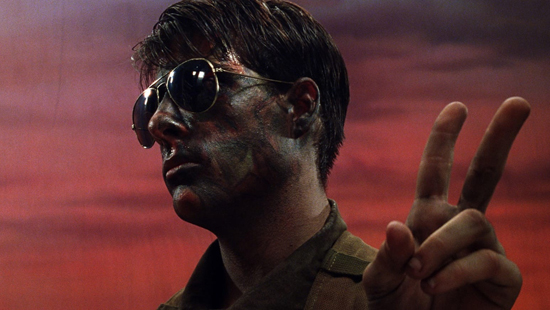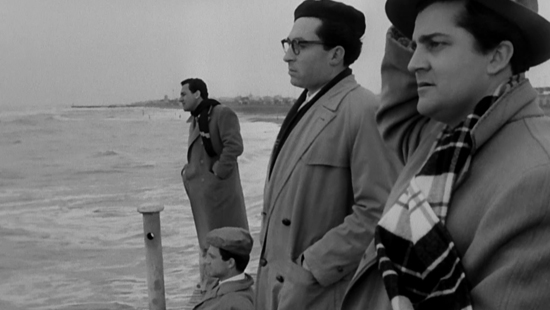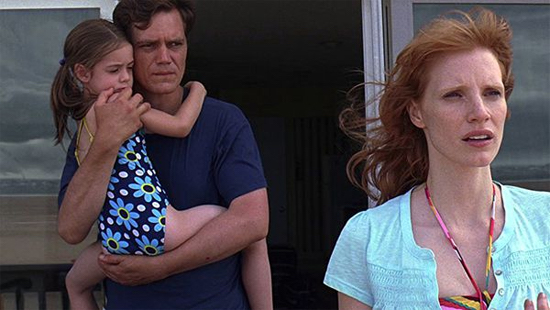TAKE SHELTER (Second Sight, out now)
With the world at the mercy of Donald Trump and climate change and the threat of Brexit, it may be an appropriately apocalyptic time to revisit Jeff Nichols’ stunning tale of Curtis, an Ohio everyman whose family threatens to tear itself apart after he begins having visions of an approaching super-storm.
Curtis’ obsession somewhat parallels Roy’s in Close Encounters of the Third Kind, but the story here is about saving the family, not leaving it. It’s also a very intimate and sensitive exploration of mental illness, particularly male mental illness, something characterised by the patriarchal "man up" approach that Curtis initially posits himself in.
The final leg of the obsession for Curtis comes in the form of expanding the storm shelter in the family back yard to make it strong enough to withstand this incredible phenomenon he predicts, which in his visions causes birds to drop dead on the ground and drives people to madness where they essentially become zombies.
But the film is about communicating; Curtis’ inability to communicate how he feels, his wife Samantha and her trying to understand his bizarre behaviour, and his deaf daughter Hannah, whose surgery is put in doubt by Curtis’ misappropriation of work equipment in a subtle jab at America’s unwillingness to accept affordable healthcare.
Nichols’ direction is understated at times and he cleverly puts his faith in the central performances of Michael Shannon and Jessica Chastain, both of whom are remarkable. Chastain’s confused wife is heartbreaking, while Shannon’s performance of a loving family man who nevertheless has something needling under his surface is mesmerising.
Take Shelter arrives from Second Sight with a beautifully detailed transfer that captures the moody cinematography of the film and its constant blue and grey hues that mirror Curtis’ mind. Critics have favourably compared Nichols to Terrence Malick and you can see that here. This is a stunning-looking film that has been presented spectacularly well on Blu-ray.
Audio stands up equally well, with a DTS-HD track that conveys the subtleties of the sound design as well as the power, together with David Wingo’s haunting score, and the disc features a well-rounded selection of supplementary features. A new interview with Nichols is perhaps the highlight, along with further interviews from the original press tour with Nichols, Shannon, and Chastain, along with a short selection of interesting but correctly excised deleted scenes.
The packaging itself is beautifully designed with new artwork using stills from the film which comes on a slipcover that houses the Blu-ray case and a 40-page booklet which features a brilliant contextual essay by Michael Brooke and a fascinating 2015 interview with Nichols by Film School Rejects writer Jack Giroux. A masterpiece of a movie and a brilliant disc.

THE UNINVITED (Criterion, out now)
It’s difficult to move for ghost stories now. Throw a baguette across Asda and you’ll undoubtedly hit a cheap DVD ripoff of Amityville 4. But back in the pre-WW2 days movies only saw ghosts as a joke or a scam.
Hurtling through in 1944 was The Uninvited, a story about a house on the Cornish coast that begins exhibiting strange things after it’s bought by a brother and sister visiting the area. It turns out that there are two ghosts accompanied by a bit of familial subterfuge and some historical murdering, and what this brings us is an incredibly atmospheric and creepy gothic picture that will have you chewing your fingers until the end title card. It looks magnificent, has a beautiful score by Victor Young (the main theme would go on to become a jazz standard), and has fine performances including the young Gail Russell in her movie debut.
Criterion have given us a lavish 2K transfer and it looks stunning. Audio is wonderfully clear and crisp, with a lossless mono track, and there are decent extras, if not plentiful. The main attraction is a 26-minute video essay that is definitely worth watching, along with a trailer and two archival presentations of radio adaptations of the film, but you really need to own this movie. It’s spectacular.

THE CHANGELING (Second Sight, out now)
Peter Medak’s 1980 horror is something of a kindred spirit with The Uninvited, with George C. Scott’s lead moving to a house in Seattle after his wife and daughter are killed in a car accident. Spooky things happen, and before long he discovers a boarded up attic room with a wheelchair, a music box, and an exercise book from 1909. It’s clear that a mystery needs to be solved and he goes about it with aplomb, scaring us half to death in the process.
It’s a classic ghost story with a touch of The Omen, and there’s a reason it has such a fine reputation amongst fans. Second Sight’s edition has a wonderful transfer from a new 4K scan, as good as the source material allows, with a stellar audio track that emphasises the fantastic sound design.
The disc is full of extras, with a commentary from director and producer, featurettes on the true story behind the house, the production design, and the fantastic musical score (although weirdly there’s no mention of actual composer Rick Wilkins), along with a short on the locations by Kier La-Janisse and an interview with horror guru Mick Garris. A great restoration of a genre classic.
Speaking of scary movies based on a "true story", THE AMITYVILLE HORROR (Second Sight, out now) is another haunted house opus that has a pretty rotten reputation mostly due to its multiple ridiculous sequels, but the original film has a decent quality to it thanks to strong lead performances from James "Josh’s dad" Brolin and the sadly departed Margot Kidder as George and Kathy Lutz, a couple who move into a house which was previously the location of a violent family massacre, and the killer Lalo Schifrin score. There’s a lot of sludge but it’s a well-shot and atmospheric picture served well by excellent picture and sound quality.
Tons of extras are provided and they’re all fine supplements, including a commentary by a psychologist who wrote a book on the house, interviews with James Brolin and Lalo Schifrin, and various featurettes. But the most interesting is My Amityville Horror, a documentary about the experiences of Daniel Lutz, Kathy’s son. It’s candid and quite sad, and an excellent addition to a great package.

CANNIBAL FEROX (Shameless, out now)
A new restoration of one of the most notorious titles of the video nasty era, with director Umberto Lenzi picking up where he’d previously left off with Man From The Deep River and Eaten Alive. A scientific expedition, intent on proving that cannibalism is just a myth, meets up with two men fleeing a village full of human meat-eaters, all of whom discover up close and personal that it’s as real as fish and finger pie. Of course, it turns out that one of the men is a sadist who had previously come looking for a diamond fortune and who is happy to undertake any number of horrific acts upon the indigenous folk, so the eventual dismemberment and feasting is a result of civilised man being the real savage.
It’s an interesting film although it meanders at times, especially with the New York-based subplot where the cops and crime bosses are both looking for mister sadist who ran off with a fortune of drug money, and it takes a while for the violence and grue to really impact. Saying that, it’s fairly spectacular when it does, with a dynamite gag where the top of a head is sliced off and people pick out bits of brain like crisps at a birthday party.
Lenzi has his social commentary and his splatter, and it’s as entertaining as it can be, but it doesn’t have the impact and power of Ruggero Deodato’s Cannibal Holocaust, which came a year earlier. It’s the most uncut release of the film in the UK since the banned VHS in the 80s, with the only real cuts understandably made to the real animal deaths, a thoroughly disgusting by-product of the genre and era.
Cannibal Ferox is presented as a 2K scan transfer, but the source comes from original 16mm negative, which has to be taken into account. Nevertheless, it looks very good considering that, and it sounds excellent and rather squelchy. The disc isn’t loaded but does come with some interesting supplementary material, including a short featurette comparing the negative before and after restoration as well as video interviews with Lenzi himself – sadly the last before he died last year – and lead Giovanni Radice, both of whom are fairly outspoken.
Lenzi tells of the crime and corruption that occurred while in production in Brazil, defends the animals deaths in the film somewhat dodgily, and bemoans that he only found out after the picture was released that actor Robert Kerman was actually a porn star who had previously appeared in Debbie Does Dallas. Radice doesn’t hold a lot of respect for Lenzi or the film, calling it the one role he regrets playing, although it’s a fairly lively and funny interview.
It would have been nice to have some more contextual information about the film and its release, especially as part of the video nasties crusade, but Shameless have put together a fine disc that no self-respecting cannibal should be without.

A RAISIN IN THE SUN (Criterion, out now)
It’s a pretty huge indictment on humanity as a race, and particularly America, that Lorraine Hansberry’s play first debuted in 1959 and yet is still frustratingly relevant. Daniel Petrie’s 1961 film adaptation that is presented here by Criterion was scripted by Hansberry herself, with Sidney Poitier leading a main cast of Ruby Dee, Claudia McNeil, and Diana Sands as the pillars of the downtrodden Younger clan, a black family living in Chicago that are forever looking for ways to better themselves following the death of the father of the family. Son Walter Lee (Poitier) wants to invest in a liquor store while his wife Ruth (Dee) just wants a better life for their son, sister Beneatha (Sands) wants to become a doctor, but it’s Lena (McNeil) who holds the key having just received a life insurance check for $10,000.
It’s fascinating to watch the performances of these four actors as the money becomes a source of frustration, hope, even jealousy, and emotions run high through every inch of film – even more so when Lena buys a house in a more upmarket (read: white) neighbourhood and the local community association send a representative to their house to offer to buy the house from them. The subtext is crystal here, and it’s an ugly and hate-filled undercurrent that both underlines the film and politics in America today. But from that we have a wonderful and important picture that aside from its relevance is a wonderful character-driven piece that we need more of today.
Criterion presents the film in a beautiful transfer that really shows off Charles Lawton, Jr.’s gritty black and white photography (Lawton previously shot movies such as 3:10 To Yuma and The Lady From Shanghai), with a fine mono audio track that is understandably very central, with Laurence Rosenthal’s restrained score never overpowering. The disc contains plenty of extras but better than quantity is their relevance and interest, with interviews with Lorraine Hansberry (presented as archival audio), excerpts on the theatrical production showing the quality of performance as well as the influence on African-American cinema. A great film and brilliantly educational package.

RUSHMORE (Criterion, out now)
Wes Anderson has been the darling king of slightly fey and dandy indie dramedy for so long now that it’s hard to remember the impact Rushmore really had back then. I remember seeing the DVD in Bristol’s long-defunct Rival Records with a ridiculous cover that made it look like it belonged to American Pie and other such sub-Animal House comedies at the time. Still, I bought it, and was mesmerised by this weird but finely-measured story of a geek (like me) who became Bill Murray’s love rival so much that he ended up cutting his brakes (I’ve never done that, honest).
While Max Fischer’s antics are a little bit smugger than I maybe thought before, it’s still an effortlessly charming and funny picture. Schwartzman is a revelation and Murray as funny as he’s always been, along with the wonderful Olivia Williams. There’s also a great British Invasion soundtrack.
The disc is packed with extras ranging from the informative (Anderson’s commentary) to the irreverent (a set of "Max Fischer Presents" adaptations of popular films from 1998 for the MTV Movie Awards), with perhaps the best being an interview with Bill Murray on the Charlie Rose show, with Murray being as funny and honest as he always is, sometimes notoriously. And of course you have the usual audio and video quality you’d expect from a modern movie put out by Criterion. Snap it up.

ITALIAN CLASSICS (Cult Films, out now)
Cult Films have recently released a range of classics from Italian cinema from La Dolce Vita to Suspiria, and have followed up with three more impressive titles. I VITELLONI is Federico Fellini’s sophomore effort, an influence on Scorsese’s Mean Streets and Lucas’ American Graffiti with five friends slacking around an Italian coastal town whose comfy equilibrium is shattered when one of them gets a local girl pregnant. Fellini treats the group and situation with acidic wit and satire and the picture is in turns hilarious and emotionally devastating, intelligently exploring relationships, infidelity, fame, notoriety, and trust.
A masterpiece. JULIET OF THE SPIRITS was Fellini’s first solo Technicolor film and more attuned to his iconic whimsy rather than neorealism. The tale of a housewife descending into a world of fantasy and metaphor in an attempt to gain her independence from her constantly unfaithful husband. It’s a fascinating and often delightful picture, dominated by the central performance of Giulietta Masina (Fellini’s own wife) as Juliet – she’s simply marvellous.
Finishing the trio is the Michael Radford/Massimo Troisi film IL POSTINO, a charming tale of the relationship between Chilean poet Pablo Neruda and poor and uneducated postie Mario. Stumbling and mumbling, Mario is starstruck by Neruda but strikes up a friendship that eventually leads to him using Neruda as a pseudo-Cyrano de Bergerac. Set to a charming score by Luis Bacalov, Il Postino is a marvellous picture, wonderfully simple and complex all at the same time.
Unfortunately, the quality of the discs doesn’t quite match up to the films. Both I Vitelloni and Juliet of the Spirits suffer, both from an unsatisfying image at 1080i and the fact they seem to have been transferred at 25 frames per second, which means they are subject to the dreaded 4% speed-up UK folks have suffered for many a year due to the PAL television system. Happily though, Il Postino has been presented correctly and looks beautiful and natural.
Both Fellini films are supplemented by fascinating audio commentaries by film writer Kat Ellinger and interviews with Professor Guido Bonsaver, while Il Postino has a single but great feature: a 45-minute interview with Michael Radford which is often candid and a lovely extra. Il Postino is an absolute recommendation but it’s more complicated for the Fellinis – both are fantastic films, but the transfers leave a lot to be desired, especially considering the swamped competition in the market today.


